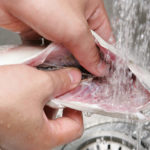Fish is a nutritious food that is good for your health, but not everyone knows how to prepare fish to remove the fishy smell and make it taste better.
Preparation to remove the fishy smell:
After buying fresh fish, you need to gut it, remove the innards, cut off the fins, and scale it. The most important step is to clean the blood and remove the black membrane inside the fish’s belly as this part has a strong fishy smell.
For fish species like snakehead, carp, tuna, etc., you need to use a knife to cut and remove the white bloodline on both sides of the fish. This tendon also contributes to the stronger fishy smell after cooking.

How to completely remove the fishy smell
For oily fish species like catfish, carp, basa fish, eel, etc., you can use wood ash to rub on the fish’s body to remove the slime. If you don’t have wood ash, you can heat up some warm water and pour it over the fish, then use a knife to scrape off the slime. This method helps remove the slime and the fishy smell effectively.
You can also use salt to replace wood ash, especially when dealing with eel or catfish.
Soaking fish in certain liquids to remove the fishy smell:
If you are sensitive to the fishy smell of fish, just rinsing it with water is not enough. After cleaning the fish, you can soak it in the following solutions to remove the fishy smell.
Tea water
Prepare a bowl of tea water and soak the cleaned fish for about 7 – 10 minutes, then take it out. The fish soaked in tea water will have much less fishy smell and taste better after cooking.
Aside from tea water, green tea is also an effective way to remove the fishy smell. You can use some green tea water or a few green tea leaves to marinate the fish. This method makes the fish fragrant and tasty.
Diluted saltwater
For saltwater fish species like snapper, mackerel, sardine, etc., which may have a fishy smell due to being frozen and not fresh, you need to remove all the blood (especially the blood clot in the spine) and the black membrane inside the fish’s belly as they are the main causes of the strong fishy smell. Cut off the innards, fins, and scales of the fish. Then, prepare some diluted saltwater. After soaking the fish in this solution for 5 minutes, the fish will be free of the fishy smell. Just drain the water before cooking.
Rice water

Rice water helps remove the fishy smell
You can use rice water to rinse the fish. Washing fish with rice water is a long-standing method to remove the fishy smell. After rinsing with rice water, rinse the fish several times under running water until it is clean.
Lime and salt
This is a common method used to remove the fishy smell of various foods. You can cut a lime in half and prepare some salt. Rub the fish all over with salt, both inside and outside, then use the lime to scrub the entire fish to remove dirt and eliminate the smell. Rinse the fish with clean water and let it drain.
If you don’t have lime, you can use vinegar as a substitute.
Alcohol and ginger
Pound and mince the ginger to extract as much ginger oil as possible. Soak the ginger in white alcohol (or cooking alcohol), then dilute the ginger-alcohol mixture in a large bowl and soak the fish, both inside and outside. Ginger and alcohol both have a fragrant scent that can help eliminate the fish’s slime.
Soaking fish in milk
Foreign chefs often soak fish in fresh milk without sugar for about 15-20 minutes to remove the fishy smell. Milk contains casein, which can effectively combine with trimethylamine in fish to remove the fishy smell.
You can use tea water, green tea, diluted saltwater, rice water, or a mixture of lime and salt. Each of these liquids has its own unique properties that help eliminate the fishy odor. For example, tea and green tea add a pleasant fragrance, while saltwater and rice water help neutralize the smell. Lime and salt work together to remove dirt and eliminate the fishy odor.
Yes, for oily fish, you can use wood ash or salt to rub on the fish’s body to remove the slime, which also helps reduce the fishy smell. If you don’t have wood ash, you can pour warm water over the fish and then scrape off the slime with a knife.
It is recommended to soak the fish in tea water for about 7-10 minutes. This will significantly reduce the fishy smell and improve the taste after cooking.
Foreign chefs often soak the fish in fresh milk without sugar for around 15-20 minutes. Milk contains casein, which combines with trimethylamine in fish to effectively eliminate the fishy odor.
fishy-smell-of-salmon/’ title=’“3 Simple Steps to Remove the Fishy Smell of Salmon”’>“3 Simple Steps to Remove the Fishy Smell of Salmon”
Are you looking for ways to get rid of that unpleasant fishy smell associated with salmon dishes? If so, we have some useful tips that can help you make a delicious and healthy meal without the fishy odor. Keep reading to learn our easy-to-follow suggestions for removing the odorous smell from salmon dishes!



































